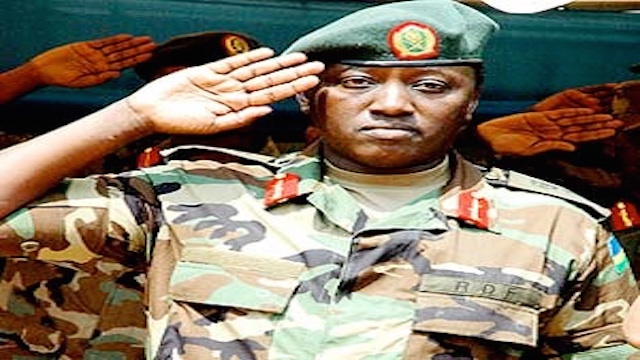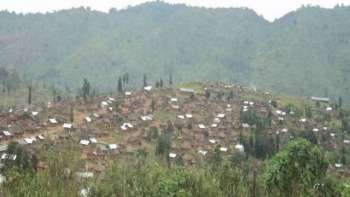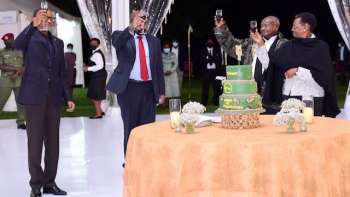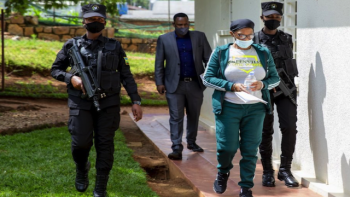He is perhaps one of the most prominent Rwandan Patriotic Front elite group accused of war crimes, crimes against humanity and genocide. The man, Emmanuel Karenzi Karake is head of Rwandan National Intelligence and Security Services (NISS). Aged 54, General Emmanuel Karenzi Karake, know as "KK", is an influential member of the circle of cronies around the Rwandan dictator Paul Kagame, mostly born in the exile in Uganda. He was one of the top military leaders of the RPF rebellion before it seized power in 1994.
The British Foreign Office confirmed in official statements that Karake was arrested Saturday by the Metropolitan Police, without giving
further details, while reminding that Great Britain and Rwanda maintain a close relationship and share many interests.
He replaced the controversial Rwandan Colonel Emmanuel Ndahiro, after South African judiciary system found that both Colonel Emmanuel Ndahiro and General Jack Nziza, who led the Department of Military Intelligence and is current the Permanent Secretary within the Ministry of Defense had ordered the failed assassination of General Kayumba Nyamwasa, a former top General Kagame's aide who was forced into exile after falling out with him. In 2011, leaked tapes of the conversations allegedly among General Jack Nziza, Colonel Emmanuel Ndahiro, Captain Francis Gakwerere, and Pascal Kanyandekwe, the alleged assassins, and General Kayumba Nyamwasa’s personal driver had surfaced and led to Colonel Emmanuel Ndahiro's firing.
Overdue Arrest
General Emmanuel Karenzi Karake was arrested in London on Saturday June 20, 2015 by British police under a European arrest warrant issued by Spain. This arrest comes seven years after the issuance of international arrest warrants by a Spanish judge, and ten years after the start of the investigations in Spain of crimes committed by RPF top 40 officials, mostly Rwandan intelligence services leaders. General Emmanuel Karenzi Karake and the 39 others were indicted in 2008 in connection with a criminal investigation for genocide and crimes against humanity committed in Rwanda and the Democratic Republic of the Congo (DRC) during and after 1994, including the killing of three Spanish members of a humanitarian association, Medicos Del Mundo.
The arrest is not the first signal from European governments regarding the indictments. In 2011, General Karake along with other Rwandan President’s closest aides set to accompany the President during his official trip to France planned for September 13, 2011 were been barred from entering France or were refused visa (see our article here). Most of these officials were among those indicted by Spain for war crimes and crimes against humanity. Others were on the list of the alleged criminals the French judiciary was investigating for the assassination of the former Rwandan and Burundian Presidents Juvenal Habyarimana and Cyprien Ntaryamira by the Rwandan Patriotic Front (RPF), the current military junta ruling Rwanda. Those who were refused the visa included Dan Munyuza, the Director of External Intelligence and General Karenzi Karake, Gasana Rurayi, Frank Bakunzi, and Wilson Gaboniza.
After the visas were denied, the Rwandan President General Paul Kagame, expressing his frustration with the Spanish indictments while addressing the leaders of the Rwandan judiciary system, openly accused Spain and Western governments of arrogance and the Spanish judge Fernando Andreu Mirelles of being irresponsible and irrational and having issued the indictments recklessly and with political motives. President Paul Kagame also disclosed that some of the alleged criminals had attempted to hand themselves to international judiciary systems but were not arrested or tried. According to the New York Rwandan Embassy sources, he was alluding to General Karake Karenzi, who was not indicted by the ICTR Chief Prosecutor Hassan Jallow (see our article: Will The New ICTR Prosecutor Focus on Rwandan RPF Crimes?).
The charges against General Karake Karenzi are well documented.
General Karenzi Karake was an immediate leader of secretive cell of parallel military intelligence in 1994 and 1997. The period coincides with many systematic mass killings in the country during the Rwandan civil war, the invasion of the neighboring Democratic Republic of the Congo and the ensuing popular insurgency. During the period, the Rwandan Patriotic Army led a campaign od systematic mass killings, mostly ethnicallyboth in Rwanda and the DRC and looting in Eastern DRC.
Human Rights Watch has documented most of the killings and General Karake was cited as the main commander behind the massacres. In 2007, Human Rights Watch called on the UN to open an investigation into his alleged role in massacres of civilians, allegedly committed by the Rwandan army in 2000 in Kisangani, eastern DRC. He was then being considered as to be Deputy Commander of UNAMID, the peace keeping force of African Union and UN in Sudan from January 2008 to April 2009. He was eventually forced to resign from the post.
He is also suspected of ordering the killing of three Spanish aid workers of the NGO Medicos del Mundo. The Spanish aid workers were assissnated after witnessing the mass killings allegedly ordered by General Karake Karenzi.
Rwandan Government goes on attack.
Rwandan governemt has rejected the accusations and formally requested an "explanation" from the government of the United Kingdom on the reasons for the arrest of General Karenzi Karake, who was about to board a plane in London on his way back to Kigali, Rwanda.
Rwandan Minister of Justice, Johnson Busingye, has told the media that said the Rwandan government would be "surprised" if the general had been arrested as part of the Spanish judicial process, which he said does not meet the criteria required by Interpol and "whose legitimacy was seriously questioned by the Spanish justice ".
On her part, the usually boistereous Rwandan Foreign Minister Louise Mushikiwabo said the arrest is "unacceptable" and is the "pro-genocidal madness".
A beginning?
In the last years, as most countries are executing the Spanish indictments, several aides of the Rwandan president were either detained or expelled from the countries. These includes: Colonel Rugumya Gacinya expelled from the USA, General James Kabarebe arrested and expelled from South Africa, Cesar Kayizari and Dan Gapfizi expelled from the USA, General Karenzi Karake, fired from the UN Peace Keeping operations and now arrested by the United Kingdom government, and Colonel Rose Kabuye, arrested and tried in France. The question is whether this may be the beginning of massive arrests of RPF officials for massive crimes committed in Rwanda and the DRC.
















